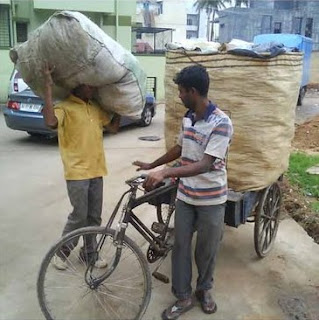Tuesday, April 20, 2010
Bundanoon, Australia - World's 1st bottled water ban
Posted on 8 Jul 2009
by Agence France-Presse
SYDNEY, July 8, 2009 (AFP) - An Australian town was set to ban bottled water on Wednesday over concerns about its environmental impact, in what is believed to be a world first.
Bundanoon, a picturesque rural town with a population of just 2,000, was expected to vote heavily in favor of the move with a show of hands at a public meeting later.
“At the moment we’ve got a lot of community support behind it. We’re confident the town is going to back it,” said activist John Dee.
“We believe Bundanoon is the world’s first town that has got its retailers to ban bottled water. We haven’t found it anywhere else.”
Local opinion was incensed when beverage company Norlex Holdings announced plans to tap an underground reservoir in the town, truck the water up to Sydney and then send it back in bottled form.
“The company has been looking to extract water locally, bottle it in Sydney and bring it back here to sell it again,” said Dee.
“It made people look at the environmental impact of bottled water and the community has been quite vocal about it.”
Dee, whose Do Something group was instrumental in a plastic bags ban in Coles Bay, Tasmania, said he hoped the ban would make people think twice about buying bottled water.
“It’s possible it will extend to other places. The main idea is to get people thinking about their usage of bottled water—we’re spending about half a billion dollars on it here in Australia,” he said.
Retailers in the New South Wales town, south of Sydney, have already agreed to stop stocking bottled water.
Activists say bottling water causes unnecessary use of plastics and fuel for transport. A New South Wales study found that in 2006, the industry was responsible for releasing 60,000 tonnes of gases blamed for global warming.
Can we consider and Adapt this in INDIA
Monday, March 15, 2010
North Pacific Ocean Gyre
In August, a team of about 30 marine scientists from the Scripps Institution of Oceanography in La Jolla, Calif., set sail to investigate the patch on a mission called SEAPLEX (Scripps Environmental Accumulation of Plastic Expedition). During the research trip, which lasted 20 days, the team got a closer look at the debris:
The plastic has been collecting in a part of the sea near the Hawaiian Islands, about midway between Japan and North America, known as the North Pacific Ocean Gyre.
One glaring question is where the debris comes from — but it’s very likely an international problem, Goldstein said. “We saw trash with different writing, both from North America and Asia.
Thursday, September 17, 2009
Can we follow Kolkota and New Delhi
The Hindu Business Line, Kolkata June 5, 2007
The West Bengal Government has enforced a ban on plastic bags
http://www.thehindubusinessline.com/2007/06/06/stories/2007060603601100.htm
Times of
All plastic bags banned in
http://timesofindia.indiatimes.com/articleshow/3986219.cms
In Kolkata, plastic bags of less than 400 microns are banned for the last two years. Full white plastic bags are also banned. The dramatic part of it is that lesser no of bags find there way to the sewers. Since our storm water and soil/waste water systems are the same for the city, as planned by the British, the water-logging problem in Kolkata has almost disappeared in the monsoon. Usually we would have roads with water in it for 3 days after the downpour. Now the water either goes away immediately, or in low-lying areas within 2 to 3 hours. Plastic bags consumption has gone down, recycled paper bags and fashionable jute "big shoppers" are in greater use today. Both are biodegradable, low skill job producing products, reasonably cheap, the jute bags are reusable, and Eco-friendly. Maybe we still have hope.
In Delhi If you are still carrying groceries or vegetables from the market in plastic bags or using them to dispose of your garbage, you run the risk of a jail term or fine, or both. Officials may give you time to find alternatives but the ban on the bag was put in place last Saturday and it covers all shopping areas and big eating joints, hotels and hospitals.
The government wants to discourage the use of bags completely and hence the complete ban.
Monday, September 14, 2009
Contributing to "Earth - the garbage planet"
 Plastic Bags disposed Irresponsibly by us are collected in few places like this one in koramangala, Bangalore. But most of the places the bags are just left unattended and pollutes the environment. Just imagine, this is only a weeks garbage from a neighborhood with some 500 houses, Whole of India uses Millions of tonnes of plastic every Year which is discarded after use - thus contributing in big way to "Earth - the garbage Planet"
Plastic Bags disposed Irresponsibly by us are collected in few places like this one in koramangala, Bangalore. But most of the places the bags are just left unattended and pollutes the environment. Just imagine, this is only a weeks garbage from a neighborhood with some 500 houses, Whole of India uses Millions of tonnes of plastic every Year which is discarded after use - thus contributing in big way to "Earth - the garbage Planet"
Saturday, September 12, 2009
Ban Plastic Bags
http://www.squidoo.com/noplasticbags
http://www.deeshaa.org/2005/09/15/banning-plastic-bags/
http://news.nationalgeographic.com/news/2008/04/080404-plastic-bags.html

